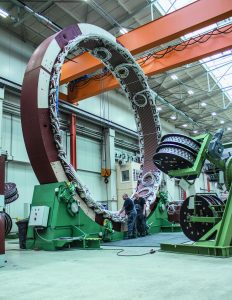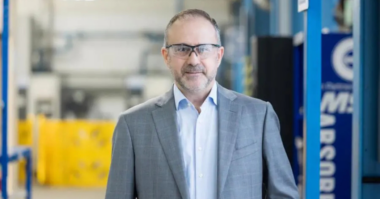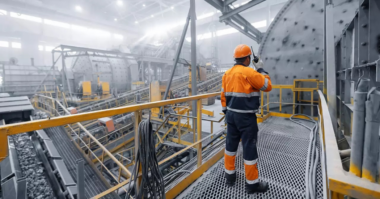One of the world’s largest wind turbine manufacturers, Enercon, is using MasoSine SPS sinusoidal pumps from Watson-Marlow Fluid Technology Group to optimise the delivery of protective impregnating resin at its Magdeburg production facility in Germany.
These robust and efficient positive displacement pumps were selected for their powerful suction capability.
Ring generators
 Among the core wind turbine components produced at Magdeburg is the ring generator, which during operation is exposed to particularly high stresses.
Among the core wind turbine components produced at Magdeburg is the ring generator, which during operation is exposed to particularly high stresses.
“In the interests of long service life, resin impregnation is an important process stage”, states Manfred Müller, the plant’s Technical Operations Manager.
By performing impregnation, several objectives are achieved. Firstly, the windings of the generator are protected against humidity, dirt and chemically aggressive substances. Secondly, a potentially disturbing hum from the wind turbine is prevented and any resulting heat can be better directed to the environment.
At Magdeburg, two MasoSine SPS 400 sine pumps are deployed. Each of the pumps delivers approximately 40,000 l/h of (15,000 mPas) impregnating resin at a pumping pressure of around 4 bar (58psi), to coat the copper windings of the ring generator.
Innovative design
MasoSine sine pumps are particularly suitable for use with high viscosity fluids as the rotation of the sinusoidal rotors creates four equal circumferential chambers, into which the impregnating resin is delivered. Sealing from the pressure side to the suction side is ensured by means of a gate on the rotor, which diverts the pumped material by 90° in the direction of rotation, or to the outlet. Since the chambers are moved as a whole, and the volume during the process does not therefore change, MasoSine sine pumps process even viscous and highly viscous media with ease.
Another benefit of the MasoSine pumps at Enercon is their high suction capability. The impregnating resin is first pumped from a reservoir through a pre-filter before it is directed to the dipping tank. However, this task proves no problem for the SPS sine pumps which, with a vacuum of up to 0.85 bar (12psi), easily have the necessary suction capacity.
Since the formation of small lumps in the resin can never be ruled out (despite using a pre-filter), the pumps must also be capable of transferring larger particles without sustaining damage.
“For the SPS 400 pumps, lumps of resin up to the size of a grape are absolutely no problem,” confirms Mr Müller.
Continuous cooling prevents gelling
Despite the attributes of MasoSine SPS technology, the impregnating resin used at Enercon has proven to be an extremely problematic fluid to pump.
“Without a cooling system, the resin naturally begins to gel quickly, which particularly with high rotational pump speeds can lead to clogging, especially of the shaft seal,” says Mr Müller. As a result, the service life of the seal – and consequently the whole pump assembly – can decrease significantly.”
Thanks to intensive co-operation between Enercon’s Magdeburg plant and MasoSine, these initial difficulties were quickly resolved and both pumps were retrofitted with a continuous cooling system that delivers coolant from heat exchangers through the pump housing and front cover. The cooling system ensures that a certain temperature is maintained on the mechanical seal, and gelling of the resin as well as clogging of the seal is thus reliably and permanently prevented.
Energy efficient pump principle
Sine pumps also offer significant energy benefits, especially in applications with high-viscosity fluids. In contrast with other operating principles, the rotor of the sine pump does not cut through the product to be delivered, meaning that, even with high-viscosity media there are only minimal frictional losses. Nor does the torque need to be appreciably increased, so there is practically no rise in energy consumption, even with higher viscosity fluids. Depending on the medium and the application, sine pumps consume up to 50% less energy than comparable displacement pumps.




